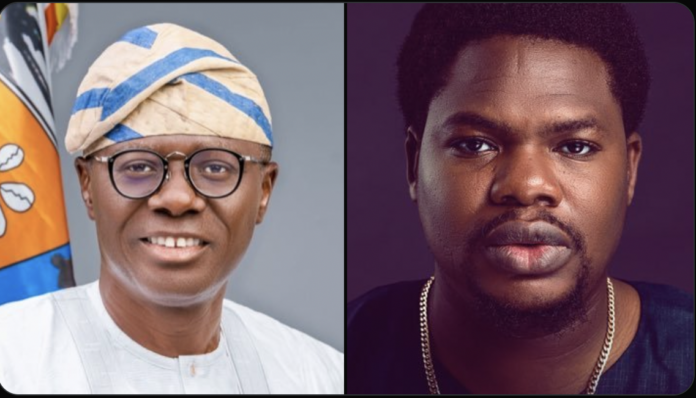Nigerian skit maker, actor, and outspoken activist, Mr Macaroni, has sparked yet another wave of controversy with a recent social media outburst, where he declared that he would continue to snub the Governor of Lagos State, Babajide Sanwo-Olu. The public confrontation unfolded after Macaroni was called out by an X (formerly Twitter) user, igniting fierce reactions across social media platforms.
On January 9, 2024, X user @OyesileJohn posted a tweet accusing Mr Macaroni of snubbing the governor to please the public. The tweet read: “To d’ifa fun a certain Macaroni who, in an attempt to please the mob, snubbed the governor of Lagos state. Omo ase.” The tweet quickly gained traction, with followers expressing both criticism and support for the controversial comedian.
Macaroni Fires Back
In a series of fiery posts, Mr Macaroni didn’t mince words in his response. “I will continue to snub your Governor. He doesn’t mean anything to me, neither do you or your father. I love that you slaves bring this issue up all the time. For every time you do, I will send you to your masters,” Macaroni declared, further cementing his position.
His outburst stirred a vigorous debate online, with many defending the activist’s stance. A commenter on X wrote, “Mr. Macaroni is not just an entertainer; he’s a man of integrity who refuses to compromise his principles. He didn’t do this for Nigerians, but for Nigeria, and for himself.”
But Macaroni wasn’t done. He took it a step further by offering a raw and personal account of his past experiences with the Lagos State government, explaining why he could never accept the governor’s authority. “I can never mingle with a government that stripped me naked, beat, tortured, brutalized, and dehumanized me,” he said, referring to a harrowing encounter he had with the police during a protest.
A Personal Recount: Why Macaroni Stands Firm
For those unfamiliar with the context, the comedian’s remarks trace back to his painful experience in 2020, during the height of the #EndSARS protests. Mr Macaroni was among the many Nigerians who took to the streets to demand an end to police brutality. He was arrested by law enforcement officers during a protest and later alleged that he was subjected to degrading treatment while in custody.
“They told me to stop disturbing the governor,” Macaroni recounted, recalling the incident that left him scarred. The police allegedly pressured him to cease his activism or face further consequences. This moment, according to Macaroni, served as a turning point in his relationship with the current administration.
His willingness to speak out on sensitive political issues, particularly corruption, human rights abuses, and poor governance, has earned him both admiration and backlash. Many Nigerians, especially the younger generation, view Macaroni as a symbol of resistance against the political elites who perpetuate what they perceive as systemic failures. For them, his refusal to bow to power reflects a rare sense of courage in a society where conformity often trumps individual accountability.
A Nation Divided on Social Media
As expected, Macaroni’s social media posts have polarized public opinion. Some defenders of the governor have questioned Macaroni’s actions, while others have taken it as a chance to critique the entire political structure.
One commentator on X pointed out, “The same Governor of Lagos state that, in a few years, even you won’t recognize his presence? Some of you hold this politician in overly high esteem, but remember, it’s just a matter of years before the tables turn.”
This sentiment reflects a growing disillusionment among many Nigerians with their leaders. They argue that politicians like Sanwo-Olu are often elevated to a status of reverence that is disproportionate to their actual contributions to society. For many, Macaroni’s refusal to engage with such politicians is seen as a refreshing break from the tradition of sycophantic support often seen in the country’s political landscape.
Others, however, have condemned Mr Macaroni’s direct attack on the governor, suggesting that it undermines the authority of the office and stokes unnecessary divisions. “Poor slave… That’s why they treat you fools like the slave you are… Who is Sanwo-Olu? Even mayors and governors in developed countries aren’t worshipped like this,” one critic remarked.
Political Symbolism or Personal Vendetta?
Despite the negative reactions, Macaroni’s continued refusal to acknowledge the governor has been perceived by many as a symbol of defiance against a government they feel has failed to deliver on its promises. Whether intentional or not, Macaroni has become a voice for those who feel disenfranchised by the establishment.
For some, the skit maker’s defiance is not just a personal vendetta against Sanwo-Olu but a broader critique of a system that has long perpetuated inequality, corruption, and social injustice. Many activists argue that figures like Macaroni are challenging the status quo and providing a voice to the voiceless.
On the other hand, critics contend that such public spats do little to bring about meaningful change. They argue that Macaroni’s actions could be viewed as a publicity stunt, undermining the seriousness of his activism. Others believe that engaging in direct confrontations with political leaders could have lasting consequences for his career, especially in an environment where government retaliation is not uncommon.

